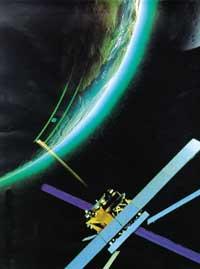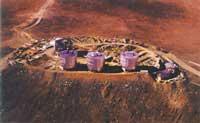Sea and space

The Sea and Space is a “virtual” program that is being carried out at the initiative of the European Commission and whose main objective is the collaboration of European schools around: “This can be a great opportunity to start working together in European centres. The program offers participants a broad theme within which there are many options. Each center will choose its own and, if necessary, can contact any European educational center to make suggestions or request collaboration in one of the branches of the project”. Although the title suggests something else, Eduardo Zabala explains first that the essence of this program is to take advantage of new information technologies: “Today it is becoming easier to inform and send it wherever it suits. Without moving from school, you have at your disposal the huge amount of information in the web and the program The Sea and Space is the way to learn how to take advantage of it”.
Eduardo Zabala is a professor at the Ondarroa Institute and coordinator of this program in Spain. The program we analyzed is part of the European Week of Scientific and Technological Culture initiative, which has the support and support of associations such as: European Space Agency, Southern Observatory of Europe, European Association for the Teaching of Astronomy, National Research and Information Centre for German Technology and Norwegian Space Centre. Among them, each State designates its representative and its main functions are the dissemination of the program and the coordination of the work of schools.
Eduardo Zabala, therefore, works on it and has clarified that they are already asking for information from many places. “The truth is that I have been asked for information from many sites, but at the moment I could not give a specific number of participants.” Among us, in the schools of Euskal Herria, there seems to be a great hobby. “I believe that this has a lot to do with having Astronomy Seminars; the Txorierri Seminar or the Aranzadi Astronomy Group have created a very interesting dynamic among us and I think we are close to new initiatives, for example, last year we held at the Planetarium astronomy at the Planetarium in Pamplona to reflect together on our work. Therefore, even if it is a town without much astronomical tradition, I would say that we are many fans”.

This program, called Mar y Espacio, aims, as has already been mentioned, to promote research in this area, facilitating computer resources that facilitate collaboration. To accomplish all this, the program has several different branches (those shown in the table above).
The possibilities of receiving and disseminating information, or managing information using the buzzword, are becoming wider. The Internet network has also achieved excellent uses in teaching in recent years, but our interlocutor has told us that the path remains very long: “There is a network in our centers, but only among teachers has opened the need for this new opportunity, which for many students remains a game tool and in which we must influence those who believe in this new way of working”.
And in that they are certainly. The Sea and Space program is already underway, in addition, at your fingertips. In the following address you will find all the details of this initiative, since it is the way of contact with Eduardo Zabala, who has informed us of all this.
ezabala@sinister
and if you want to search for information on your own:
http:/www.ucm.es/OTHER/Astrof/pamplona/apea/mye.html
Let's play...Human beings have been traveling the seas for hundreds of years. At this moment, on the other hand, space is the point of view, a constant search that allows us to know better the world around us. The Sea and Space program has organized a kind of “championship” over all this. Students between 10 and 13 years old, both individually and collaboratively, must complete dinners and those between 14 and 18 years old, a kind of magazine with graphics and photographs. The best dinners will be exhibited at the World Exhibition to be held in Lisbon. Groups that have developed the best journals will also attend. And among all the winners will also choose the most orderly work of the year, which will have an extraordinary prize: Europa del Coro Launch Base and card to visit the Long Range Telescope located in Cerro Paranal in Chile. |





